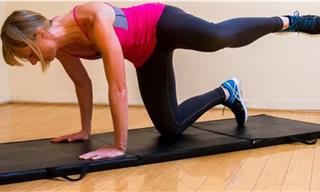“Basically, what research has shown is any activity that can increase the heart rate to be in that kind of moderate-intensity zone is going to be considered enough aerobic activity to help be protective of the heart,” said Jennifer Soo Hoo, an assistant professor of clinical rehabilitation medicine at Weill Cornell Medicine.
There are several effective ways to raise your heart rate for the recommended amount of time, some of which you might not even think of as exercise. Here are 6 such expert-recommended heart-healthy activities.
1. Brisk walks
A brisk walk at a pace of 3 to 4 miles per hour is an excellent activity. Walking is both accessible and low impact, meaning that it's easy on your joints. Compared to jogging, for example, the likelihood of injury while walking is minimal.
You want to reach 50-70% or 70-85% of your maximum heart rate for moderate or vigorous-intensity activities, respectively. You can estimate your maximum heart rate by subtracting your age from 220.
There are numerous ways to measure whether or not your walking pace is high enough to effectively target the cardiovascular system. You could use a wearable device, such as a smartwatch, to record your pulse. Using a device like that will help you tell how long your heart rate was in that moderate-activity zone.
Keep in mind that there is no need to invest in a pricey device if you don’t already own one. You can measure your pulse yourself by placing your index and middle fingers on either the inside of your wrist or the top of your foot. Count for 15 seconds and multiply the number of beats you get by four.
In the end, your intuitive perception of how much you’re exerting yourself is usually correct. Ask yourself, “Does this feel somewhat hard? Did my breath quicken?” If you are trying to carry on a conversation while walking, and you need a breath every five or six words, that is consistent with a moderate-intensity activity.
To make brisk walks more fun, you can do them in pairs with a friend or family member. If you have a dog, you can incorporate your exercise in their morning or evening walks.
Related: These Mistakes Might Be Making Your Walks Less Effective
2. Household chores
Household chores like gardening, mopping the floor, mowing the lawn, and the like, can be really effective at raising your heart rate. These tasks definitely require some physical exertion. If you do them quicker than usual and track your pulse, it can absolutely count as a heart-healthy activity. And, of course, there is the bonus of killing two birds with one stone and getting plenty of housework done, too.
3. Strength-building exercises 
According to the American Heart Association, practicing a strength-building activity two days a week has an ‘indirect’ effect on building heart health. Strength training increases your muscle mass and improves bone density, both of which have been linked to a decreased risk of cardiovascular events, such as coronary artery disease, stroke, etc.
“In order to be able to do aerobic activities for long periods of time, you need to be able to increase your strength and flexibility,” Soo Hoo explained to the Huffington Post. You can achieve this through yoga or pilates, both of which build core strength and flexibility. Alternatively, you could opt for lifting weights or using resistance bands.
Related: Study Finds There’s No Age Limit to Start Strength Building Exercises
4. Leisure time
Exercise doesn’t necessarily mean that you must follow a strict regimen, and it certainly doesn’t have to feel like a chore. There are many moments in life where you raise your heart rate, and you might not even realize it, because you’re having so much fun. We’re talking about the times you dance to a playlist of your favorite tunes, run around with the kids or grandkids, or even play fetch with your dog.
Take note of such activities that bring you joy and get you moving at the same time. This will motivate you to do them more regularly.
5. Keeping your stress level in check
It is no secret that feeling stressed or tired can be harmful to your physical health as well. Stress can make your blood pressure spike. Therefore, it puts a strain on your heart and circulatory system. Prolonged mental and emotional stress can cause your resting heart rate to increase over time. If the “fight-or-flight" mode becomes your norm and your resting heart rate rises, this will also increase your risk of heart attack, stroke, and other dangerous health conditions.
Adopting healthy coping techniques like mindfulness, meditation, deep breathing, or therapy can keep your resting heart rate in check.
6. "Snack" exercises
The recommendation is 150/75 minutes per week, but you don’t have to do it all at once. If taking three 45-minute walks a week doesn't suit your schedule, it doesn’t mean that you have to give up altogether. You can break it down in any way that is convenient for you.
A recent study published in the journal Applied Physiology, Nutrition, and Metabolism, found that short bouts of physical movement - like briskly climbing stairs a few times a day - can effectively improve your fitness level, as well as lower blood pressure and reduce blood sugar. The concept of “exercise snacks” can be a helpful way to sneak in fitness throughout the day without being overwhelmed.
Share these tips with friends and family!
 Go to BabaMail
Go to BabaMail

























































